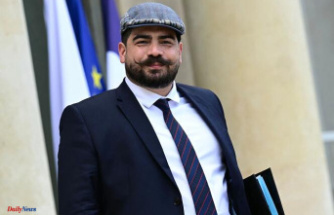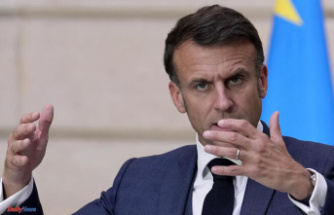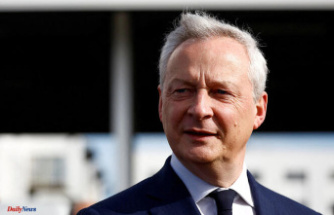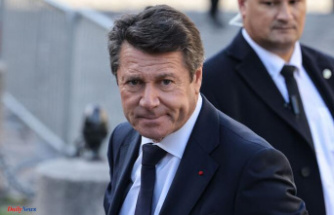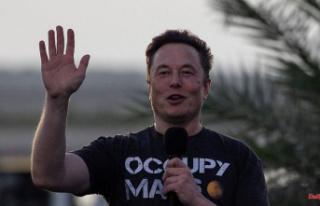The Greens are coming together in Bonn for a party conference in the most difficult of times. To begin with, the delegates decide on calls for comprehensive help for consumers and companies in dealing with inflation. Federal Minister of Economics Habeck caresses the spirits.
At the start of their three-day party conference in Bonn, the Greens decided on demands for a comprehensive package of measures against energy price inflation. An emergency motion submitted by the party leadership received broad approval. "This is how we turn a much-vaunted winter of anger into a winter of solidarity," said party leader Ricarda Lang. In the application, the party speaks out in favor of the price brakes for gas and electricity announced by the federal government, for the European skimming off of excess profits from electricity producers and for the idea of a solidarity tax for large energy companies introduced by Brussels.
"The Green DNA is justice," said Lang in her freely and passionately delivered opening speech, for which the co-chair received standing applause. The application largely corresponds to the plans of the traffic light coalition, with the Greens claiming a large share of the social measures for themselves and fighting against the image of a party of higher earners. In addition, the Greens spoke out in favor of capping so-called index rents linked to inflation. The traffic light should help companies - "the economy with a broad and well-financed rescue package".
It is the first time since 2019 that the party has met again for a face-to-face party conference. More than 800 delegates and more than 1000 guests are expected. In the afternoon, numerous demonstrators from the climate protection and environmental movement, from Greenpeace to Fridays for Future and various opponents of opencast mining gathered in front of the building. They demanded that the nuclear phase-out at the end of the year be strictly adhered to and that the planned demolition of the town of Lützerath be stopped in favor of lignite. Federal Economics Minister Robert Habeck and North Rhine-Westphalia's Economics Minister Mona Neubaur agreed to this demolition in return for an early coal phase-out in NRW by 2030.
The fact that both decisions were made by Green politicians is immensely alienating to the Greens' natural alliance organizations. "The Greens have promised climate protection and that's not possible with Lützerath," said a Greenpeace representative to ntv. "Where it says green, there should also be green inside," read a banner from the Fridays for Future group in Bonn. "We can stand it," Lang called out to the delegates. The Greens would take up and debate opposing opinions. But outside the door, a deep rift could be seen between the party and its front organizations.
Consolation was given by Robert Habeck, who was greeted with thunderous applause after his political speech despite mistakes in the gas levy, despite criticism of the continued use of coal and nuclear power plants and the demolition of the Lützerath housing estate. The former Greens leader praised his party for making and supporting incredibly difficult decisions in an incredibly short time since entering government. "I've never felt as at home as I did in this phase and I've never felt as proud as in this party," said Habeck. Followed by a barely hidden broadside against the FDP: "We don't have to think about what we were founded for and why we're in the government. We don't have to sharpen our profile."
Since the Lower Saxony elections, which were disastrous for the Liberals, there has been trouble at the traffic lights because the FDP is questioning Habeck's nuclear power plans and is thus terminating agreements that have already been made from the Greens' point of view. "Fossil energies and nuclear power gave us this energy crisis. They are not the solution, they are the problem," said Habeck. The climate protection minister agreed with the delegates that the party would experience "hostility" in the foreseeable harsh winter because the party stands for everything that Putin and his supporters hated. "Putin must not win, not on the battlefield and not in the economic war against Europe."
Later in the evening, the party wants to decide on a second emergency motion, in which Federal Minister of Economics Robert Habeck and the party leadership want to get backing for extending the use of nuclear power beyond the turn of the year. Habeck wants to send two southern German nuclear power plants, Isar 2 and Neckarwestheim 2, to an operational reserve in order to be able to fall back on them until spring. However, the vote also includes a clear no to the continued use of the Emsland nuclear power plant and the purchase of new fuel rods. The FDP, however, demands that both power plants and the Emsland nuclear power plant be put into operation. Habeck could no longer agree to this if the party waves through the emergency motion.
But for parts of the Greens, the operational reserve of two nuclear power plants beyond New Year's Eve is too much. An application from the party base that is assessed as having little prospect of success calls for the nuclear phase-out at the turn of the year to be adhered to. Party veteran Jürgen Trittin wanted to sharpen the wording of the board of directors by means of an amendment in order to ensure a definitive end to nuclear power next spring. Trittin's suggestions were incorporated into the motion shortly before the vote. This now states that the use of nuclear power plants should definitely end on April 15th and defines even more precisely in which emergency scenarios the nuclear power plants may be transferred from the operational reserve to active use.
This means that Habeck, who supports the application, has little opportunity to approach the FPD demands in search of an agreement in the nuclear power plant dispute. Chancellor Olaf Scholz had promised that an agreement should be reached by the beginning of the week.
Among the guest speakers in the evening were DGB boss Yasmin Fahimi and BDI president Siegfried Russwurm. In her guest speech, Fahimi called for a "politics bold with change" and warned of a "division" in society. She spoke out in favor of a "protective shield for jobs" and a second direct payment based on the example of the energy price premium in order to help people as quickly as possible.
Fahimi appealed to the traffic light parties not to tear themselves apart. "Now is not the time for party tactics. Every ideological blockade will cost people dearly," warned Fahimi, praising the "pragmatism" that the Greens had already shown in many places. The former SPD general secretary encouraged the Greens to enforce a suspension or reform of the debt brake against the FDP.
Russwurm said: "We will only overcome the crisis if we listen to each other." He promised: "We will decarbonize the industry in Germany." However, the way there was changed by the Russian war of aggression against Ukraine and its consequences. The BDI President underlined the seriousness of the situation: "In my view, a recession in the coming months - sorry to say - is unavoidable."
On Saturday and Sunday, the party wants to deal with international security policy and arms exports as well as climate policy, among other things, with the topic of Lützerath being debated again. Neither Lang's affirmation that Germany should supply Ukraine with more weapons nor Habeck's words that the demolition of Lützerath would hurt caused any expressions of displeasure in the hall. Whether the peace in the party is actually so great, will be seen at the weekend.


